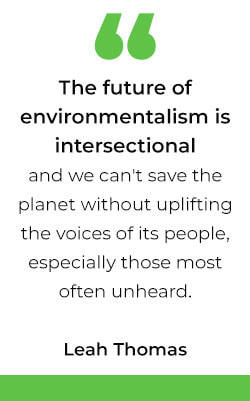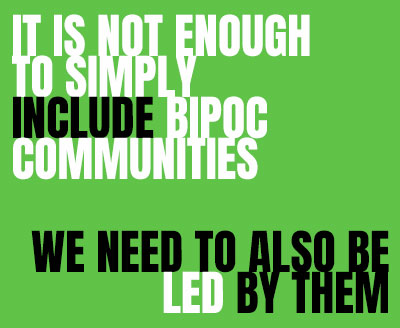 by Zaynab Ahmed The zero-waste movement is a fairly new and emerging environmentalist effort to eliminate waste from daily life completely. It has expanded tremendously and remarkably quickly throughout the nation since its inception in the 1980s shortly after the founding of Earth Day in the 1970s. However, there is a large proportion of society that lacks easy access to education and resources related to zero waste movement efforts. The zero-waste movement lacks intersectionality and has even been called out for its racist presentation. The zero-waste movement aims to emphasize the inclusion of all people and the creation of communities through these zero waste initiatives to better the planet for our entire society. However, we currently see a failure to recognize the current racial-based identity divide taking place. Zero waste portrayal is centered around white, middle to upper-class voices and fails to incorporate BIPOC and unprivileged communities who are most affected by the environmental issues the movement focuses on. Environmental racism has extensively made an appearance in all environmental movements, the zero waste movement included. Why is the implementation of intersectionality so vital within environmentalism? Leah Thomas, an environmentalist who advocates for intersectionality within the discipline states, “The future of Environmentalism is intersectional, and we can't save the planet without uplifting the voices of its people, especially those most often unheard.” Intersectional environmentalism strives to protect people and the environment simultaneously. It works toward providing equity to the masses of those who find passion within environmental pursuits and highlights environmentally-related injustices done on vulnerable communities. Intersectional environmentalism is vital for those who identify with underrepresented communities and aspire to have a voice for environmental issues they wish to bring to attention. As a black first-generation immigrant woman, growing up underprivileged and underrepresented, struggling to find the balance between my many intersectional identities, I viewed caring about environmental affairs as a privilege for years. Advocating for matters that directly pertain to the infliction of violence and suffering on people because of issues of racism or injustice seemed to me, far more pressing. However, what I failed to realize or was never taught was that environmental issues do directly inflict suffering especially on those of minority races and within underprivileged communities. We see very few voices within the zero waste movement from minority races largely because it is more challenging for them to voice their achievements and struggles within this movement compared to their white and privileged counterparts. The movement needs to also reflect more diverse experiences to broaden its audience and appeal. It is significantly more difficult for BIPOC communities to resonate with the zero waste movement when they see none of their personal experiences with environmentalism reflected in popularized conversations and efforts. Also, the movement is inaccessible to underprivileged groups who lack the necessary resources and financial means to participate. Failing to acknowledge and create solutions for these issues further contributes to the problems of environmental racism and social injustice.  However, it is not enough to simply include BIPOC communities but rather we need to also be led by them. If we are simply asking for the bare minimum requirement of being included more in the zero waste movement, we will most likely still see BIPOC communities having a small influence. Environmental racism is systematic and deep-rooted and requires significant amounts of work to combat as well as to gain more equality. Organizations that promote zero-waste efforts that are made of BIPOC people and for BIPOC people are the best aids for this issue. It allows for minorities to create their platform and format their creation of what this movement is to them. Minneapolis Climate Action works actively towards solutions to combat environmentally racist issues within the Minneapolis Area. Some of our ongoing projects include creating a curriculum to educate the East African predominant community within Minneapolis on sustainability solutions and providing resources for them to be able to implement sustainable practices into their lives. As a zero-waste ambassador at MCA with intersectional identities, I hope to aid in changing the face of zero waste and provide a diverse and unique perspective to its efforts.
1 Comment
|
AuthorChris Torres Archives
December 2023
Categories |

 RSS Feed
RSS Feed
